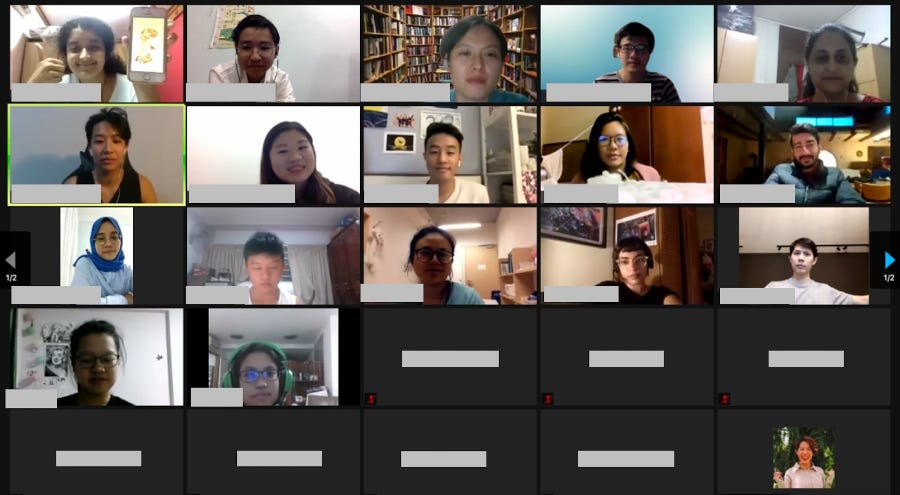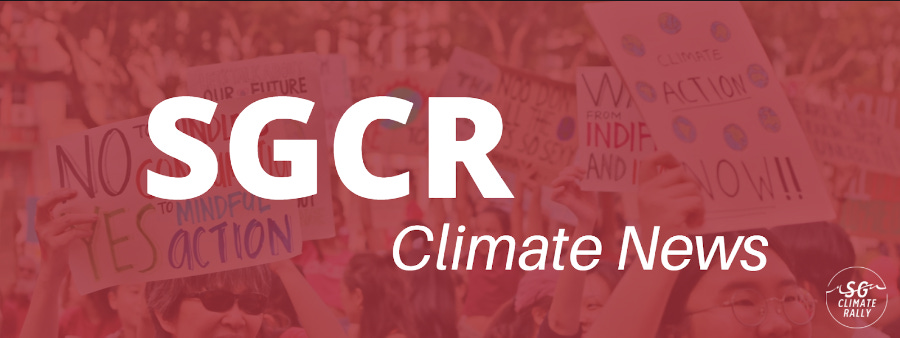#BuildBackBetter with SGCR!
Dear friend,
In the blink of an eye, November has flown by.
This month, SG Climate Rally joined other youth groups in hosting Asia Climate Rally — a regional day of action to call upon our governments to invest in our futures by divesting from fossil fuels. Though Asia is one of the most vulnerable regions to the climate crisis, some of our countries are also some of the biggest funders of the fossil fuel industry. Hence, we call for a collective and collaborative effort across governments to focus on a green and just recovery post-COVID-19. If you have missed the livestream, you may watch it on Facebook or Youtube!
At the Asia Climate Rally, we also unveiled our new Calls to Action, inspired by your submissions in our #TakeBack2050 campaign. This year, we have broadened our Calls To Action to reflect the intersectional nature of climate change, and made it clear that the green recovery we need must be a just one that leaves no one behind. We ask you to join us in calling our government and society to bring Power to the People, Launch a Green Recovery, and Redefine Pragmatism and Growth. Read more about our demands here.
We are also incredibly honoured to have been able to participate in The Nature Book Club along with The Maju Collective, Eco Youth Collective, and Speak for Climate in a reading of ‘Eating Chilli Crab in the Anthropocene’: a collection of essays published by our dear friends at Ethos Books. We are grateful to the National Library Board for making this event possible. If you haven’t picked up this book but would like to, please do so here.

Finally, we are thankful that the COVID-19 dormitory cases have declined dramatically since the Circuit Breaker. However, we ought not to forget that migrant workers still face a plethora of issues regarding their emotional welfare and working and living conditions here. Since the release of Project Open Doors in October, we have received public support with regards to the petition for restoring the freedom of our migrant workers. We are grateful for all the signatures so far, so for those who have yet to sign it, do show your support! Find out more about the well-being of our migrant friends here. This year has been characterised by a pervasive sense of solitude — worldwide lockdowns have forced us to lead more atomised, isolated lives. Yet, we hope the Asia Climate Rally is a pressing reminder that for us to emerge stronger from the climate crisis, we need collective action and commitment.
Thank you for spending another month with us. Till we speak again in December!
For a better world,


C L I M A T E N E W S
THE MONTHLY ROUND-UP
On 28 November, the Clean & Green Singapore Virtual Carnival was launched by the National Environment Agency (NEA) to promote actions that individuals can take to protect the environment and mobilise community action. We commend NEA’s efforts to bring environmental consciousness to the public, especially since cooperation from individuals is essential in the transition to a more sustainable Singapore. However, we were also disheartened to see that, once again, the burden of saving the environment has been overwhelmingly placed on individuals instead of governments and corporations, with little mention of any concrete action to regulate our polluting industries. Moreover, the call for greater climate action that the civil society has been urging for has been overlooked. Moving forward, we hope to see the government and companies acknowledge their power to manage the climate crisis and to use it for good.
Using computer models to generate a COVID-free 2020 for comparison, NASA researchers found that since February, pandemic restrictions have reduced global nitrogen dioxide concentrations by nearly 20 percent. On a city-level, 50 of the 61 analysed cities showed nitrogen dioxide reductions between 20-50%. “In some ways I was surprised by how much it dropped," said lead author Christoph Keller with Universities Space Research Association (USRA) at NASA's Goddard Space Flight Center, "Many countries have already done a very good job in lowering their nitrogen dioxide concentrations over the last decades due to clean air regulations, but what our results clearly show is that there is still a significant human behaviour-driven contribution." Even as restrictions were eased, the decreases in nitrogen dioxide lessened, but remained below expected "business as usual" values.
Recently, General Motors chief executive Mary Barra wrote a letter to America’s largest environmental groups detailing the company’s withdrawal of support for the Trump administration’s efforts to strip California of its ability to set its own fuel efficiency standards. Considering the company’s demands for Trump to loosen Obama-era standards on fuel economy and climate-warming emissions throughout his term, this sudden backpedaling of support is extremely bold and unexpected. More importantly, this may indicate industry-wide support for the tougher regulations on pollution that the Biden administration will most certainly reinstate in its efforts to combat climate change. Such a drastic reversal of support may also aid in growing the company’s share in the electric car market, with Mary Barra agreeing with president-elect Biden’s statement, ‘I believe that we can own the 21st century car market again by moving to electric vehicles,’ in her letter. Ultimately, corporations are motivated by profit, and with the rise of new markets driven by the green economy, the transition to more sustainable methods of production will be made easier and more swiftly as companies strive to capture the growing market.
With Chinese President Xi Jinping declaring that national carbon dioxide emissions should now peak before 2030 rather than around 2030 two months ago, it has sent positive shockwaves throughout the climate-policy world. China is considered a “hybrid” superpower: a global leader that does not yet have a fully advanced economy. Achieving its lofty climate ambitions will be no easy feat, and China’s new target is currently an ambition, not legislation. China now aims to eliminate some ten billion tons of annual CO2 emissions – nearly a third of the global total – from 2030 onward, equivalent to decarbonising the entire French economy every year for 30 years. However, a glimmer of hope also lies in China’s robust green energy sector and China’s impressive record of scaling up clean-energy technologies means that its recent net-zero emissions pledge should further boost the ongoing low-carbon revolution around the world. The world will be watching the progression of this situation intently.
Recently, MP Louis Ng posted a video, urging Singapore to tackle the climate emergency that we are facing through stronger policies such as raising the carbon tax. He emphasized on doing more to "mitigate and not just adapt to climate change”. True enough, the government’s plan to spend over $100 billion dollars on building seawalls, reclaiming land and other adaptation measures are not enough to protect ourselves from the increasing uncertainties and challenges posed by the ever-changing climate. There is much more we can do, and we are looking forward to more MPs speaking up in Parliament on this matter and pushing for stronger climate action.

S G C R R E C O M M E N D S . . .
BOOKS TO READ 2.0
Finished reading last month's recommended books and hungry for more? This month, we are once again recommending books to read, and this time you are guaranteed to be kept occupied, for here is a list of 108 books recommended by our dear friend. Happy reading!
To end off, here’s a video featuring a young climate activist from Hong Kong --Lance Lau Hin-yi! For those of you who have watched the Asia Climate Rally, he was one of the speakers there! At only eleven years old, he wishes to educate more people, including adults, to fight the climate crisis.
That is all for this month’s newsletter, see you in the next issue!


